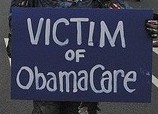Affordable Care Act: In The Eye Of The Beholder
Tomorrow, the constitutionality of the Affordable Care Act will likely be handed down by the Supreme Court. There are two main pieces under consideration: the individual mandate, and Medicaid expansion.
According to John Stephen, New Hampshire’s former Health and Human Services Commissioner, Medicaid expansion will cost the state an additional $1 billion over ten years. Currently, Medicaid costs the state $1.4 billion annually, so this brings the cost up about 7 percent per year. To Stephen, this is a “huge amount of dollars.” To Deb Fournier of the liberal-leaning New Hampshire Fiscal Policy Institute, this would be a “healthcare bargain” — although as she understands it, Medicaid expansion may bring about no new costs at all.
In New Hampshire, the Affordable Care Act is most certainly in the eye of the beholder.
Families USA, a “national nonprofit, non-partisan organization dedicated to the achievement of high quality, affordable health care for all Americans,” says that if both the Individual mandate and Medicaid expansion are deemed constitutional, most individuals in New Hampshire will be better off. “On average, each household in New Hampshire will be $1,662 better off in 2019,” Families USA has calculated using Jonathan Gruber’s MicroSimulation model, which takes into account the costs of Medicaid expansion, ACA tax credits, resulting wage and tax increases among other factors.
Here’s their breakdown by income level:
- Households with income under $30,000 will be $4,306 better off.
- Households with income between $30,000 and $50,000 will be $1,772 better off.
- Households with income between $50,000 and $100,000 will be $1,353 better off.
Because of the Medicare payroll tax, Kim Bailey at Families USA explains, those making over $250,000 a year would see a net loss of $3,423.
But Senate Majority Leader Jeb Bradley, R-Wolfeboro isn’t convinced that most Americans would be saving money. The provisions that have already been implemented, Bradley said at an anti-ACA press conference yesterday afternoon, have resulted in “higher premiums, deductibles, and copays.” These provisions include requiring insurance companies to allow young people up to age 26 to stay on their parents’ insurance; no lifetime limits on coverage; and small business tax credits available to 80% of New Hampshire’s small businesses. Sen. Bradley did not mention the individual mandate, which might reduce those costs. He did comment on the overall cost of the ACA:“The estimated cost when the Affordable Care Act was signed was $1 trillion over 10 years. It’s now estimated it will cost $2 trillion over that same amount of time. We’ve seen what’s happened in Europe with these kinds of costs that are unsustainable.”
One thing both Sen. Bradley and NHFPI’s Deb Fournier agree on is the potential costs an individual mandate might have on the state’s Medicaid system. Right now, there exists a hard-to-quantify population in New Hampshire that is eligible for Medicaid, but choosing not to use it. If those people are forced to have health insurance, there could be an unanticipated influx of Medicaid enrollees who were always eligible, but only now have chosen to sign up. These enrollees would cost the state more than the newly eligible enrollees, who are subsidized much more by the federal government.
And then there’s the impact of the ACA on business — yet another can of worms. Jeffrey Carlisle, a Stratham-based entrepreneur critical of the 906-page Affordable Care Act, told the Union Leader: “The real problem is that the sheer complexity of the act creates a high cost and unpredictable environment for investors… a massive amount of money is dedicated toward an alphabet soup of regulations.”
But not all businesses oppose the ACA. In fact, at least half of small business owners want the act to be upheld, according to a recent Small Business Majority survey.
One boon for businesses is the small business tax credits available for companies with fewer than 25 workers earning $50,000. However, in the first two years of availability, more than half of eligible business-owners didn’t even know it was available.
Yesterday we published a chart outlining the possible outcomes of the Supreme Court decision. What we didn’t include were the outcomes conditional to the November elections. “Repeal and replace,” was the mantra Sen. Bradley took during the conference his office organized yesterday afternoon, referring to the possibility that the act is upheld.
Whatever happens in Washington tomorrow morning, the debate is unlikely to end anytime soon.



